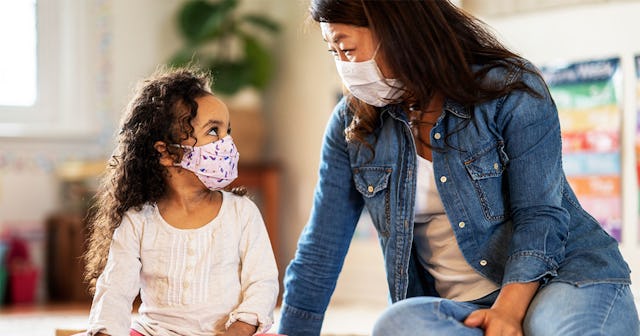Let’s put away the argument that face masks make it hard for kids to understand or learn emotions
As we end our second year living with the COVID-19 pandemic, a common concern among parents is that their mask-wearing kids will be emotionally stunted from not being able to read the facial expressions of their caregivers and teachers — or that they’ll be delayed socially.
But a new study, published in JAMA Pediatrics, shows that kids are not at all affected in these ways by face masks — in fact, they can read emotions fine even if someone is masked up.
“It’s important [for children] to recognize emotions and the concern is that making them wear masks might then impair their ability, but this study shows it doesn’t,” Dr. Hugh Bases, a developmental and behavioral pediatrician in the Department of Pediatrics at Hassenfeld Children’s Hospital told Healthline. “What it shows is despite the fact that we have to wear masks, the ability of a child to recognize emotion is not impaired.”
Read that twice, anti-maskers. Masks aren’t hurting your kid’s social or emotional development.
The study took 276 preschoolers ages 3 to 6 and showed them 90 pictures of actors — half wearing masks and half without. The actors depicted common emotions (joy, anger, sadness) and the kiddos were asked to match their expressions with matching emoticons. The older kids did better than the younger kids, but all of the kids did about the same when it came to reading the emotions of people with masks on versus reading the emotions of people without.
Specifically, the kids as a group got the right answer 70.6 percent of the time without face masks, and 66.9 percent with face masks — a small and negligible difference.
Experts added that kids get a lot more information than a still picture when they’re interacting with adults and each other in their daily lives, masks or not.
“Any effect would likely be overstated given the additional visual, verbal, and dynamic cues adults give preschool aged children regarding emotion recognition. I have seen no evidence that demonstrates negative effects of mask wearing in preschool age children, and this study supports the no emotional harm statement,” Dr. Eric Cioe-Peña, director of global health, Northwell Health, tells Healthline.
Ashley Ruba, a developmental psychology expert in the Child Emotion Lab at University of Wisconsin-Madison, had the same opinion: covering our mouths and noses doesn’t mean that we can’t express ourselves or that others can’t understand how we’re feeling.
“I like to point out that the face isn’t the most important way we communicate our emotions, it is only one way,” Ruba tells CNN. “We also use tone of voice, we have body posture, we have other kinds of contextual clues that kids and adults can use to figure out how people are feeling.”
And the very small difference in the rate of recognition is not a big deal, either, according to doctors. Not to mention that even though they might spend their day with a masked caregiver or educator, they get to see unmasked adults for large chunks of time anyway.
“Kids are fairly resilient,” said Bases. “Any time you have a skill that is either not being obtained or not achieved because of some limitation, kids are fairly adaptable and resourceful. Kids see emotion not just through teachers, but also parents, siblings, grandparents, and other sources of transmission of emotional state.”
It’s also worth noting, yet again, that face masks work, and they are working in our schools to lower coronavirus transmission rates. Especially until our kids all get vaccinated, we need to keep wearing them in these settings — and now we have more research that shows it’s perfectly healthy for our kids.
